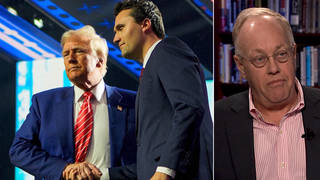
Topics
Guests
- Arnie Arnesenpolitical commentator and 1992 Democratic New Hampshire gubernatorial candidate.
- Renny Cushingstaff member of the Democratic Caucus of the New Hampshire Legislature and in the 1970s a founding member of the Clamshell Alliance, one the most successful U.S. anti-nuclear movements.
A conversation with New Hampshire veteran political activists Arnie Arnesen and Renny Cushing about the current political landscape after the so-called U.S. congressional Republican Revolution when power shifted to the Republicans after the 1994 mid-term elections. In the state of New Hampshire, Republicans have enjoyed majority power for 142 years — since the U.S. Civil War — essentially creating a “one-party” state (as well as a “one-TV-station” and “one-newspaper” state). Long-term Republican corporate-government power effectively perpetuates entrenched spheres of influence and a tightly controlled, closed system, disallowing real conversation between the majority and minority peoples/parties. A PSA featuring Gov. Steve Merrill promotes economic development and tourism by proclaiming: “It’s right in New Hampshire!”
Segment Subjects (keywords for the segment): Republican Revolution; one-party politics; New Hampshire politics–history
Other mentions: Seabrook Nuclear Power Plant; Clamshell Alliance; Gov. Steven Merrill; John H. Sununu; Newt Gingrich; Bob Dole; Phil Gramm; white supremacists; Martin Luther King Jr. Holiday
Transcript
AMY GOODMAN: Today is President’s Day, and tomorrow is the New Hampshire primary. Welcome to the maiden voyage of Democracy Now!, Pacifica’s daily national election show. Greetings to our audiences in California, Texas, New York, Pennsylvania, Washington, D.C., Washington state, Kansas City and Colorado. In this election year, we’re embarking on a nine-month journey through the country and hope to pick up community radio stations in many more states as we go, as we give voice to the grassroots.
In today’s show, we’ll look at the one-party politics of New Hampshire, with the other party. Then we’ll talk about the INS crackdown on immigrants and the English-only law. Is the primary feeding xenophobia?
Did you realize New Hampshire is the only state in the union that doesn’t recognize Martin Luther King Jr.’s birthday? A kind of new PC conservative rhetoric has led to a changing rationale for the denial. The latest reason: Dr. King was against the war in Vietnam.
And finally, you’ve heard of Forbes magazine’s list of the 400 wealthiest people in the country. Well, Mother Jones magazine has got its own list: the 400 largest contributors to campaigns. Who are they? Why have we never heard of them? And who are they paying for? Pacifica’s national affairs correspondent, Larry Bensky, will be speaking with the editor of Mother Jones magazine.
That’s the show. Now to our first segment, where we survey the political landscape of New Hampshire. Our guests, Arnie Arnesen, who ran against Governor Steve Merrill in 1992—Merrill is also the national chair of Bob Dole’s election campaign. Arnesen is currently a political commentator and runs a small think tank—and may run for Congress this year.
We’re also joined by Renny Cushing, a staff member with the Democratic Caucus of the New Hampshire Legislature. In the ’70s, he was a founding member of the Clamshell Alliance, one the most successful anti-nuclear movements in the country.
Well, let’s begin with Arnie Arnesen. Arnie, you say New Hampshire is what the post-Republican Revolution looks like. What do you mean by that?
ARNIE ARNESEN: Well, if the essence of the revolution is new federalism and the purity of local control, then visit New Hampshire, because we define local control probably better than anyone else. In fact, we don’t even have state government here, because you see local communities basically fending for themselves, and what you see is just tremendous inequities between have-not communities and have-lot communities. And that’s led us to having the highest property tax rates in the United States and tremendous inequity in our school system.
AMY GOODMAN: What about income tax?
ARNIE ARNESEN: Excuse me? Oh, New Hampshire, you mean. Well, New Hampshire has this incredible reputation of being one of two states in the United States that has neither a broad-based income tax or a broad-based sales tax. Just to let you know what the other state is, it happens to be Alaska. And Alaska is a state that has a lot of oil fields and mineral wealth, so they don’t need taxes, because they just tax that stuff. So, income taxes has been something that has been an anathema to the state, because we’re incredibly tax-adverse. And that’s been fueled by Bill Loeb’s Union Leader.
AMY GOODMAN: Now, before we get to the Manchester Union Leader, because in addition to being a one-party state, it’s a one-paper state, I wanted to ask about your run against Steve Merrill, the current governor, in 1992. Did you raise the issue of income tax?
ARNIE ARNESEN: Oh, did I raise the issue? Well, what was interesting was, was that when I decided to run in the Democratic primary, not only was I prepared to say the word “income tax,” but I was obviously saying no to the pledge, which is historic in New Hampshire. And just to give you a sense of where the history of my state is, no candidate ever saying the word “income tax” had ever won a primary on either the Democrat or Republican side. I mean, that’s how chilling it is to talk about tax reform. You can’t even get out of the box in either party, because we’re so afraid of both the Union Leader and that tax pledge that seems to dominate our politic here.
AMY GOODMAN: In fact, you’ve come into the national primary debate, haven’t you, on the issue of a flat tax on Steve Forbes?
ARNIE ARNESEN: This is almost spooky, you know? I mean, if you see Steve Forbes running right now, like what’s interesting is, is that Steve Forbes is being accused of being Arnie Arnesen in drag, because, in fact, he’s offering up a tax reform measure that sounded actually very similar to mine. But one of the things that most people don’t know about New Hampshire is that actually in our constitution we are forbidden to have a progressive tax, so if you need to change taxes, you need to do it with a variation on the flat tax theme. And, in fact, when I ran, I ran on a flat tax with $36,000 deduction—sound familiar?—and it was at a rate of 6 percent, but obviously the revenues were going to be used to lower the highest property tax rates in the country. But that never actually entered the conversation, because Governor Merrill managed to lie about my tax, the similar way he lies about Steve Forbes’s.
AMY GOODMAN: Now, how long have the Republicans been in power in New Hampshire?
ARNIE ARNESEN: Renny, is it about 142 years?
RENNY CUSHING: It’s about—yeah, about since the Civil War.
ARNIE ARNESEN: That’s right.
RENNY CUSHING: I mean—but in 1901, there was actually—it was maybe the low point, when in the New Hampshire Senate there was one Democrat, was the entire caucus. So, like any one-party state, I mean, I think the—you know, the old communists in the Soviet Union would look longing—with great envy upon the Republican Party in the state of New Hampshire, because, you know, its unbroken tenure. And what happens is that it becomes, you know, kind of corrupt, and then the corruption becomes so pervasive, it becomes invisible, and people just think that of course it’s just normal to live in a one-party state where everyone has the same kind of thought.
ARNIE ARNESEN: Well, you know, and the interesting thing is, let’s think of what the Republican Revolution—happened in 1994—what was Newt Gingrich’s claim to fame? He said it’s unthinkable that Congress should be controlled by one party for 40 years; imagine how rotten it gets after 40 years. Well, Renny and I can run around the state of New Hampshire and say, “Well, if it’s rotten after 40 years, how rank must it be after 142 years?” I mean, it’s just so unhealthy for even the party in power, because even they need to clean house, and they’re incapable of doing it. And that really creates, I think, a terrible situation both for that majority party, and it makes it almost impossible for the minority party to ever see any opportunity to sort of carry on a real conversation.
RENNY CUSHING: Another thing they’ve done is essentially they’ve privatized state government. I mean, we have a keiretsu here in the state of New Hampshire, where corporations and business influences provide the support infrastructure for state government. It’s a revolving door. And, for instance, like, legislators in the state of New Hampshire get paid $100 a year. I mean, that automatically precludes people who work for a living from serving in the state government.
AMY GOODMAN: Renny, I wanted to stop for a second to go back a little in your own history. You were one of the engines of a movement that challenged the power structure of New Hampshire. It went beyond anti-nuclear activities to really going to the heart of corporate and government power. While some might say you ultimately stopped the building of nuclear power plants in this country, Clamshell was also the springboard for the rise to power of Governor and then Bush Chief of Staff John Sununu. Can you talk about that history?
RENNY CUSHING: Well, I don’t know. The history still lives on today. I know that in challenging—in challenging Seabrook, it was challenging an entire industry. And one of the things that took place in New Hampshire is that we perhaps paid the price for drawing a line on nuclear power. But people like John Sununu used that as an issue. I thought one of the things that struck me as kind of pathetic was seeing Senator Dole going over to John Sununu’s house on this Saturday, offering to shovel his lock in exchange for his endorsement for the presidency.
ARNIE ARNESEN: I think it’s called “groveling.”
RENNY CUSHING: Groveling. Senator—it used to be senators travel; now it’s senator grovel. He didn’t get it, but John Sununu and the forces that support him still exercise tremendous amount of power here in the state of New Hampshire. The other thing is that the forces that built Seabrook, that, you know, gave us the highest electric rates—
ARNIE ARNESEN: Right.
RENNY CUSHING: —in the country, exercised this control of things like this court system. I mean, the—we sit now—part of the legacy of the struggle against Seabrook, unfortunately, is that David Souter sits on the Supreme Court of the United States.
AMY GOODMAN: What do you mean?
RENNY CUSHING: Well, Sununu—I mean, Souter was appointed to the Supreme Court because he carried the water for public service company. He—when he was attorney general of the state of New Hampshire, he oversaw a campaign of police infiltration of the anti-nuclear movement. He made sure that people who circulated anti-Seabrook petitions in parking lots or state liquor stores were arrested. He took that apparatus of state government and put it at the disposal of, you know, our state’s largest utility. And that was not without exploiting—
ARNIE ARNESEN: But there’s also a message here, Renny, too, I think, which is so interesting, because Renny mentioned that we today have the highest electric rates in the United States, which is what’s so chilling about the sort of end result of Seabrook. What’s even more interesting, though, is that this is maybe a message to corporations around the country, which is there’s always a higher bidder than you when you’re buying politics, because historically the public service company that controlled the governor’s seat was the one that obviously got Seabrook online and brought us these highest utility rates. However, having very high utility rates suddenly means that you don’t want to accommodate that industry anymore, and suddenly, for the first time ever, the public utility in our state doesn’t own the governor, because it’s more important for his future political career to undermine that utility. And now, in fact, that’s exactly what’s happening. And it’s really kind of scary, because you actually realize that it’s not about what’s good for your state. It’s not about a rational utility policy. It’s about buying and selling politicians.
RENNY CUSHING: Yeah. I mean, another irony about Seabrook is the utility that build Seabrook, actually constructed it, recently obtained a sweetheart deal for a reduction in its electric rates, because it couldn’t afford to purchase the power from the plant that it built. So, it got a subsidy, and meanwhile residential rate payers throughout the rest of New England are having to pay the bill for the utility’s mistakes.
AMY GOODMAN: You’re listening to Renny Cushing, who is currently a staff member with the Democratic Caucus of the New Hampshire Legislature, and also Arnie Arnesen, who is maybe running for Congress this year. Before we go to that run and what it’s like to be a Democrat and a woman in New Hampshire, Arnie, I wanted to ask Renny two quick questions. And one has to do with what happened—in just a few minutes we’re going to be talking about the issue of race in New Hampshire and the fact that Martin Luther King’s birthday isn’t honored in New Hampshire. But you were inside the New Hampshire Legislature when the nationalist white supremacist party was outside on January 15th.
RENNY CUSHING: Right. And, you know, the nationalist movement, white supremacist organization from Mississippi, held a “No King on—over us,” a “Thank you, New Hampshire” rally on the steps of the New Hampshire State House on Martin Luther King’s birthday. And I tell you, it was—people come to New Hampshire and use it as a platform to speak to the national media, but it also holds the mirror up to us. And what I heard, unfortunately, echoed from the steps from white supremacists is not all that different from what I had heard inside the State House from state representatives, who would say things like, “Well, there are no black people in New Hampshire, so we don’t need a Martin Luther King holiday.” To its—for whatever reasons, because I think it’s concerned about its public image, the Legislature did pass a resolution that condemned racism.
ARNIE ARNESEN: But it wouldn’t mention Martin Luther King Day in that resolution.
RENNY CUSHING: It wouldn’t mention—and it also got hung up over the issue of homophobia. I mean, there are people who think that it’s perfectly acceptable to “I don’t hate people of color, but I do hate fags.”
AMY GOODMAN: So, they passed a—they passed a resolution condemning racism and anti-Semitism but said, “We’re homophobic, and we’re proud”?
RENNY CUSHING: Well, and at the end of the day, it did include homophobia, but part of it—part of the controversy was over homophobia.
AMY GOODMAN: Well, I—
ARNIE ARNESEN: And people need to understand, though, that we have been trying to get Martin Luther King—I mean, this has not been over a lot of people’s incredible work and activity. A lot of school systems closed down on Martin Luther King. A lot of cities recognized Martin Luther King. I mean, there may be some inertia in Concord, but there are communities all over the state that are basically repulsed by that behavior and have really sort of led the—led the action on recognizing Martin Luther King. And in that sense, I’m really happy to be part of that crowd.
AMY GOODMAN: We’re going to talk about Martin Luther King’s birthday in just a few minutes with one of those nonexistent African Americans, who will be existing with us on the show today. But I wanted to go on to the issue of the one-paper state, the fact that the Manchester Union Leader has such control in New Hampshire. Why don’t you talk about that, Arnie Arnesen, and what it means for you, as a Democrat, to have run against the governor in the state, and what it will mean for your future when you run as—for Congress?
ARNIE ARNESEN: Well, I guess it’s a good-news/bad-news story. The good news story is, I’m not sure the Manchester Union Leader is as powerful today as it was maybe 15 years ago, for a number of reasons. One, people stopped reading. I mean, that’s a—that’s a fact of life all over the country, is that most people are now obtaining their news and their information from either talk-show hosts or TV. And as a result, the Union Leader has somehow lost its ability to really sort of control the power structure. I mean, it can do some destructive things, but it’s really not capable of energizing some positive stuff. Obviously people are going to give it credit for Pat Buchanan, but I give Pat Buchanan credit for—from other sources, not just the Union Leader. And from my perspective, the Union Leader just sort of adds to my credibility. I mean, the more—the more they attack me as a taxer, the more I would smile and say, “Yes, what else is new?” So, in a lot of ways, the Union Leader was not the sort of negative information source for me, although it does definitely aid and abet the people in power. And in this case, Stephen Merrill is clearly closely linked to the Union Leader, and it clearly helped him.
What has actually eclipsed the Union Leader, however, is not only are we a one-newspaper state, we are now a one-TV-station state. And we used to refer to the channel 9 as WGOP, but I hate to tell you what I used to refer to it as. I used to refer to it as MTV—Merrill Television—because Stephen Merrill happened to be their legal counsel prior to his run for governor, during his run for governor, and conveniently, his campaign headquarter were on the second floor of the building where on the third floor channel 9 was housed, so he never even had to leave his building to get tremendous TV coverage statewide. And obviously that was the greater help for him getting out his misinformation campaign.
AMY GOODMAN: Now, let’s back up for a second, because while Steve Merrill is close to the Manchester Union Leader, he’s also chair of Bob Dole’s campaign. Hasn’t the Manchester Union Leader come out in support of Pat Buchanan?
ARNIE ARNESEN: Oh, yes. And that’s causing Steve Merrill some problems, don’t you think, Renny?
RENNY CUSHING: Well, I think it is. And I think it’s—you know, Merrill just had no other place to go but Bob Dole, and much to the chagrin of the Union Leader. But the point about channel 9 is absolutely correct.
ARNIE ARNESEN: Yeah, it’s—
RENNY CUSHING: You know, that’s—and that, you know, we live in the will—and, actually, that was John Sununu, I think, was the first person that really recognized the power of the television, that things had changed. Sununu used to sit—I thought he was like the second anchor. He’d be on there every night—
ARNIE ARNESEN: That’s right.
RENNY CUSHING: —giving sin. And because we have a one-party state, again, all power flows to those who—who hold office. And they accommodate that.
ARNIE ARNESEN: And what’s more frightening is, we can actually tell you today who they’re grooming to replace Steve Merrill, because we are now seeing one particular Republican getting tremendous exposure on channel 9 as a quote-unquote “political analyst.” We are seeing one Republican being given 10 minutes every Tuesday morning before the highest-rated morning news show to do something called Education Matters. And what you’re seeing is, is that channel 9 is basically providing a beauty contest for this guy and lots of face time, because otherwise nobody would know who he was. And they’re actually laying the foundation for him to run for governor.
AMY GOODMAN: Who is he?
ARNIE ARNESEN: Who is he?
AMY GOODMAN: Yeah.
RENNY CUSHING: Ovide—
ARNIE ARNESEN: It’s Ovide Lamontagne.
RENNY CUSHING: The other thing that happens now, not only do we see Merrill’s face all of the TV as governor and as chief hatchet man for Bob Dole, but also channel 9 does these public service announcements that feature Merrill’s face, you know, saying, “It’s right in New Hampshire,” which is kind of a message to promote economic development, to promote skiing, and he has all this free face time on television.
ARNIE ARNESEN: I mean—
AMY GOODMAN: It’s what in New Hampshire? It’s right?
RENNY CUSHING: It’s right.
ARNIE ARNESEN: It’s right.
RENNY CUSHING: It’s kind of an interesting code. Some people—is it “white in New Hampshire”? No, it’s “right in New Hampshire,” and it’s white in New Hampshire. It’s right in New Hampshire because it’s white in New Hampshire.
AMY GOODMAN: And we’re going to be joined by Salim Muwakkil in just a second, our co-host from Chicago, and we’re going to talk about race issues. But, Renny Cushing, what about this primary where the Democrats are unopposed? How long has it been since there’s been an uncontested Democratic primary? And what does this do to the discourse?
RENNY CUSHING: Well, the—I mean, if you don’t count 1964, when LBJ—right after Kennedy was assassinated, it hasn’t been since the 1930s since there was an unopposed primary. I think, you know, due to the unique circumstances of the Gingrich revolution, people were kind of—I think the fact that there isn’t a primary in the Democratic Party is OK. But—
ARNIE ARNESEN: I actually think it’s actually more than OK, Renny, because what you’re seeing is some very brutal infighting between Republicans. It’s really sort of—really sort of changing people’s sort of opinion of them. And it’s just—it’s very nasty. It’s disgusting. It’s not issue-oriented. They’re running ads about other people’s ads. I mean, there’s absolutely—
RENNY CUSHING: Right.
ARNIE ARNESEN: —no content. They’re kind of a vacant lot when it comes to really providing choices even for Republicans.
AMY GOODMAN: But doesn’t it also mean that—
RENNY CUSHING: But what the—but the thing that bothers—the thing that strikes me about it, though—and this hit me last—last summer, when Pat Buchanan went in front of a shuttered factory in Exeter and said, “Bob Dole and Phil Gramm got in bed with Bill Clinton, passed NAFTA and sent your jobs to Mexico.” Buchanan spoke to the economic dislocation of a large segment of the population’s feeling. And you don’t have to talk about taxes, talk about abortion, talk about gun control, talk about the deficit. For the 80 families whose jobs are no longer there, Pat Buchanan was the only person that was speaking to their pain.
AMY GOODMAN: Renny—
RENNY CUSHING: Unfortunately, he has a reactionary message. But what there wasn’t echoing there was not a—
ARNIE ARNESEN: There was no Democratic message.
RENNY CUSHING: —discussion on the progressive side.
AMY GOODMAN: And on that note—on that note, we’re going to have to wrap up this session. I want to thank you very much, Renny Cushing, with the Democratic Caucus in New Hampshire Legislature, one of the founders of the Clamshell Alliance, and also political commentator Arnie Arnesen, as she makes her decision this year whether to run for Congress. Later on Democracy Now!, our weekly segment “Money Talks,” the top millionaires who are investing big bucks into the political campaigns. Salim Muwakkil joins me for a look at racism, New Hampshire-style, after this break. Stay with us.










Media Options